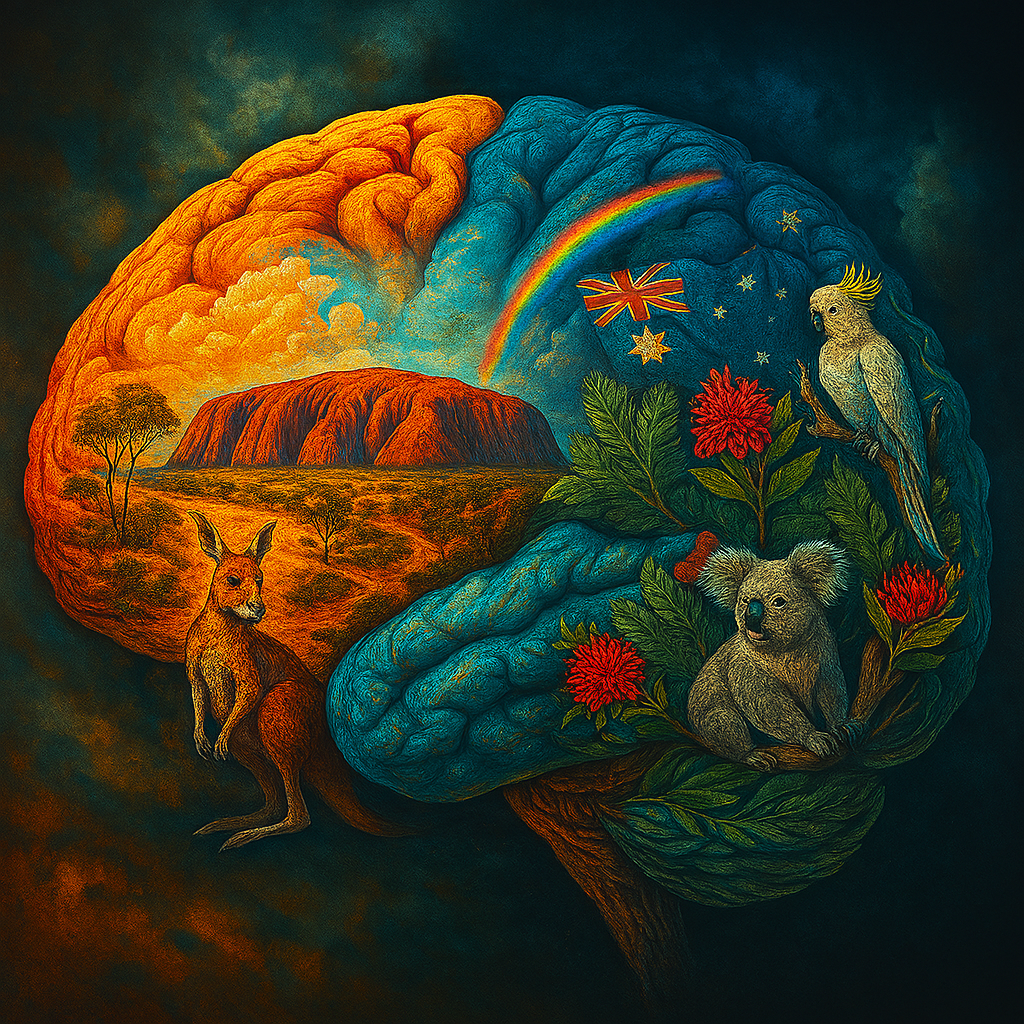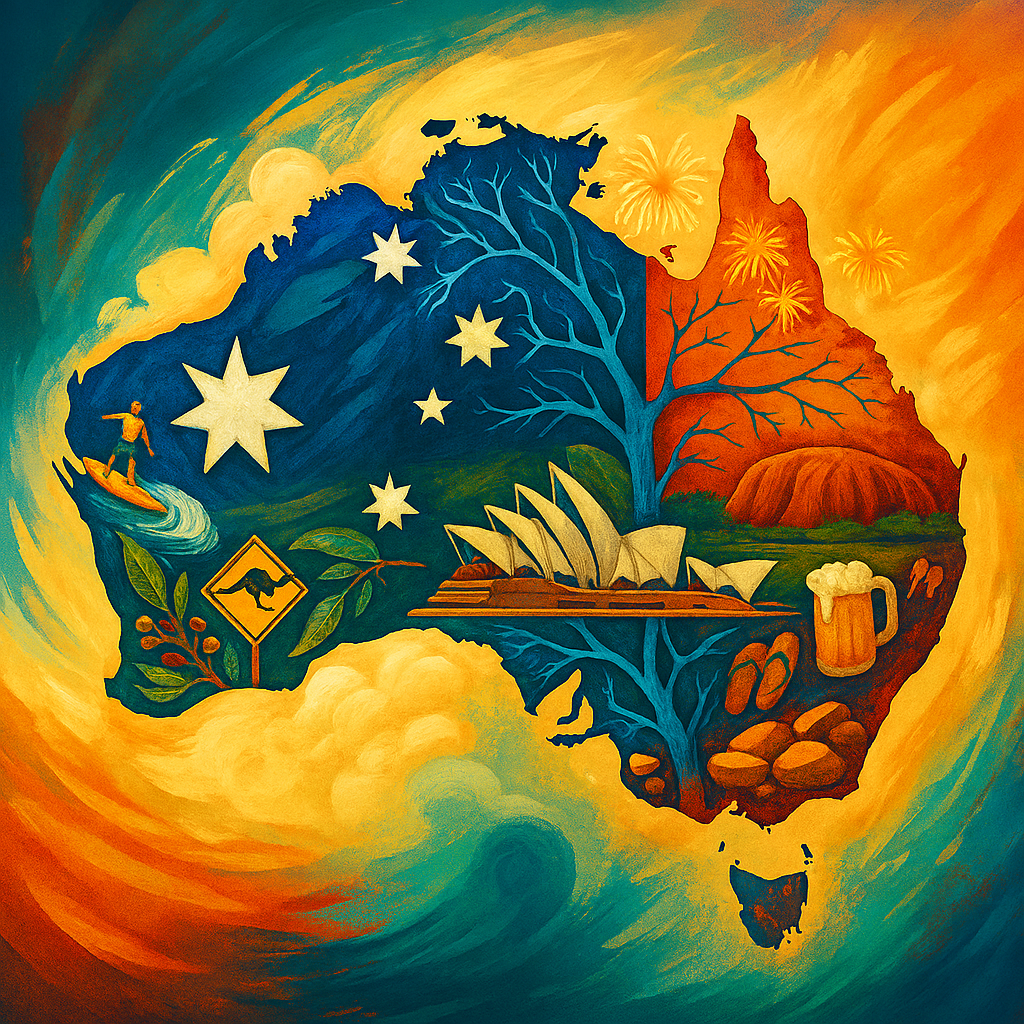The Interesting Heritage Psychology Of Australia Good And Bad
Psychology Of Australia – Understanding The National Mindset
Australia’s psychology as a nation is shaped by its unique geography, history, and cultural diversity. The collective mindset reflects resilience born from living in a land of extremes, where droughts, floods, and bushfires have forced generations to adapt. Australians often balance optimism with realism, creating a distinctive national character that is both hopeful and pragmatic. The psychology of the country is influenced by Indigenous heritage and modern multiculturalism, producing a blend of continuity and change in the national psyche. Australians value freedom, fairness, and community, which shape their outlook on life and their approach to challenges. The harsh environment has fostered adaptability and toughness in the population, while isolation can create challenges for mental health and social cohesion. The psychology of Australia is marked by pride in achievements and awareness of limitations, with sporting success and natural beauty reinforcing national confidence. Yet debates about country identity, history and recognition reveal underlying tensions that complicate this pride. Australians often express humor and informality, reflecting a relaxed cultural psychology that helps them cope with adversity. Economic prosperity contributes to optimism, but inequality can undermine stability and create divisions. The psychology of the nation is shaped by both urban dynamism and rural struggles, with city life offering opportunity and rural life demanding resilience. Australians embrace innovation while holding onto traditions, balancing progress with continuity. This balance reflects a layered and complex national mindset that evolves with global and local pressures. Resilience is celebrated, but vulnerability is acknowledged, showing that strength and fragility coexist. Understanding this psychology requires examining both strengths and weaknesses, as the national psyche is a mirror of pride and contradiction. The psychology of Australia is not static but constantly adapting to new realities. It is a story of resilience, humor, contradiction, and pride.

Table – Key Elements Of The Australian Mindset
| Element | Positive Influence | Negative Influence |
|---|---|---|
| Geography | Builds resilience | Creates isolation |
| Heritage | Provides continuity | Can spark tension |
| Multiculturalism | Enriches identity | Risks cultural friction |
| Humor | Encourages resilience | May mask deeper issues |
| Prosperity | Fuels optimism | Inequality persists |
National Identity – Pride And Contradiction
Australia’s national identity is a complex psychological construct shaped by history, culture, and geography. Pride in sporting achievements, natural landscapes, and democratic traditions fuels a strong sense of belonging. Australians often celebrate their reputation for resilience, humor, and informality, which reinforces a collective self-image of toughness and friendliness. Yet contradictions emerge when questions of Indigenous recognition, immigration, and multicultural integration are raised. The psychology of identity is therefore both empowering and unsettling, reflecting pride alongside discomfort. Australians embrace the idea of fairness, often expressed through the cultural value of the “fair go,” but debates about inequality reveal tensions beneath the surface. National pride is reinforced by international recognition, whether through sporting victories or cultural exports, but this pride can sometimes mask deeper insecurities. The psychology of identity is also shaped by the tension between urban cosmopolitanism and rural traditions. Australians in cities often see themselves as globally connected, while rural communities emphasize continuity and heritage. This duality creates a layered identity that is both modern and traditional. Pride in multiculturalism enriches society, but cultural friction can challenge cohesion. Australians often express confidence in their democratic system, yet political polarization can weaken trust. The psychology of identity is therefore not static but constantly evolving. Australians are proud of their humor and relaxed lifestyle, but this can sometimes obscure serious issues. Pride in natural beauty reinforces environmental consciousness, yet debates about resource use complicate this pride. The psychology of identity reflects both strength and fragility. Australians often balance pride with humility, recognizing achievements while acknowledging shortcomings. This balance creates a distinctive national character that is admired globally. Yet contradictions remain, shaping ongoing debates about who Australians are and who they aspire to be.
Points – Identity Psychology Insights
- Pride in sporting achievements strengthens unity
- Natural landscapes reinforce national confidence
- Democratic traditions build trust and fairness
- Indigenous recognition remains a challenge
- Immigration enriches culture but sparks debate
- Multiculturalism fosters diversity and friction
- Urban cosmopolitanism contrasts with rural heritage
- Humor reflects resilience and informality
Community Spirit – Solidarity And Isolation
Community spirit is central to the psychology of Australia, often expressed through the cultural value of mateship. This concept emphasizes loyalty, support, and solidarity, particularly in times of crisis. Australians have demonstrated remarkable unity during bushfires, floods, and pandemics, showing that collective resilience is a defining trait. Volunteerism is widespread, with individuals contributing to local organizations, charities, and emergency services. This spirit strengthens communities and builds trust among citizens. Yet isolation remains a challenge, particularly in rural and remote areas where distance and limited resources can weaken social bonds. The psychology of community is therefore both empowering and fragile, depending on circumstances. Urban areas benefit from diversity and cultural exchange, while rural communities rely on continuity and tradition. Digital networks have expanded opportunities for connection, but they cannot fully replace face-to-face interaction. Loneliness remains a hidden issue, particularly among the elderly and marginalized groups. Australians love celebrating community events, festivals, and sporting gatherings, which reinforce a connective belonging and identity. These events highlight the importance of shared experiences in shaping the national psyche. Yet the pressures of modern life, including economic stress and mobility, can weaken community ties. The psychology of community reflects both solidarity and vulnerability. Australians value connection, but they also struggle with isolation. This duality shapes the way individuals perceive themselves and their place in society. Community spirit is therefore a source of strength, but it requires ongoing support and attention to remain resilient.
Table – Community Psychology
| Aspect | Positive Outcome | Negative Outcome |
|---|---|---|
| Mateship | Builds loyalty | Can exclude outsiders |
| Volunteerism | Strengthens networks | May strain resources |
| Rural Life | Reinforces heritage | Creates isolation |
| Urban Diversity | Expands exchange | Risks fragmentation |
| Digital Networks | Increase support | Cannot replace presence |
Resilience – Adaptation And Strain
Resilience is a defining feature of Australia’s psychology, shaped by the challenges of its environment and history. Australians have adapted to droughts, floods, and bushfires with creativity and determination. This resilience is celebrated as a national strength, reinforcing pride and confidence. Yet resilience can also mask underlying strain, as individuals push through challenges without addressing deeper psychological needs. The psychology of resilience reflects both toughness and vulnerability. Australians often embrace innovation as a way to adapt, whether in agriculture, technology, or community organization. Economic downturns have also tested resilience, with individuals finding ways to recover and rebuild. This adaptability is admired globally, but it can come at a cost. Stress and fatigue are common, particularly in industries exposed to environmental and economic pressures. The psychology of resilience is therefore layered, reflecting both empowerment and risk. Australians often celebrate their ability to “bounce back,” but this narrative can obscure the need for long-term recovery. Cultural flexibility also contributes to resilience, as Australians embrace diversity and change. Yet this flexibility can dilute identity, creating uncertainty. Resilience is therefore both a strength and a challenge. Australians value toughness, but they also recognize vulnerability. This balance shapes the national psyche, creating a distinctive character that is admired but complex. Resilience is not static but evolves with circumstances. Australians continue to adapt, but they must also address the psychological costs of constant strain.
Points – Resilience Psychology
- Environmental challenges build toughness
- Economic downturns encourage innovation
- Crisis response strengthens unity
- Stress and fatigue undermine wellbeing
- Cultural flexibility promotes openness
- Identity dilution creates uncertainty
- Resilience narrative can obscure vulnerability
- Long-term recovery requires attention
Aboriginal Australians – Continuity And Challenge
The psychology of Aboriginal Australians is rooted in tens of thousands of years of cultural continuity, spiritual connection to land, and collective identity. This deep heritage shapes a worldview that emphasizes relationality, kinship, and holistic wellbeing. Aboriginal and Torres Strait Islander peoples often describe health not just in physical terms, but as a balance of body, mind, spirit, and community. Colonisation disrupted these systems, introducing trauma, displacement, and systemic exclusion. Despite this, Indigenous communities have shown extraordinary resilience, rebuilding language, reclaiming land, and revitalizing culture. The psychology of Aboriginal Australians is shaped by both historical pain and cultural strength. Social and emotional wellbeing frameworks have emerged to reflect Indigenous perspectives, emphasizing empowerment, self-determination, and cultural safety. Aboriginal psychologists have played a key role in decolonizing mental health practices, challenging Western models that ignore cultural context. Community-led healing initiatives, such as yarning circles and cultural camps, foster reconnection and identity. Yet challenges remain, including underrepresentation in services, racism, and intergenerational trauma. The gap in mental health outcomes between Indigenous and non-Indigenous Australians persists, despite policy efforts. Aboriginal Australians often face barriers to accessing culturally appropriate care. The psychology of identity is shaped by ongoing struggles for recognition and justice. Connection to Country remains central to healing, offering spiritual and emotional grounding. Indigenous knowledge systems provide alternative ways of understanding wellbeing, rooted in story, ceremony, and place. The national psyche must reckon with these truths to move forward. Aboriginal Australians continue to lead conversations about truth-telling and reconciliation. Their psychology reflects both continuity and challenge, strength and vulnerability. Respecting and integrating Indigenous perspectives is essential to building a more inclusive national identity.
Table – Indigenous Psychology Themes
| Theme | Strength | Challenge |
|---|---|---|
| Connection to Country | Spiritual grounding | Displacement and land loss |
| Cultural Continuity | Identity and resilience | Intergenerational trauma |
| Social and Emotional Wellbeing | Holistic healing | Underrepresentation in services |
| Community-Led Healing | Empowerment | Limited funding and support |
| Indigenous Psychology | Decolonizing mental health | Systemic barriers persist |
Work Ethic – Drive And Burnout
Australia’s psychology of work is shaped by a balance between ambition and leisure. The national character values productivity, fairness, and opportunity, reflecting a belief in hard work as a pathway to success. Australians often take pride in their ability to contribute meaningfully to their communities and industries. This drive is reinforced by cultural narratives that celebrate achievement and resilience. Yet burnout is a growing concern, particularly in high-pressure sectors such as healthcare, education, and corporate environments. The psychology of work therefore reflects both strength and vulnerability. Australians often emphasize work-life balance, with leisure activities such as sport and travel seen as essential to wellbeing. However, economic pressures can undermine this balance, creating stress and fatigue. Remote work has reshaped identity, offering flexibility but also blurring boundaries between personal and professional life. Australians value fairness in employment, often expressed through strong labor rights and workplace protections. Yet inequality persists, with some workers facing precarious conditions. The psychology of work is therefore layered, reflecting both empowerment and strain. Australians often celebrate ambition, but they also recognize the importance of rest. This duality shapes the national psyche, creating a distinctive character admired globally. Work ethic is not static but evolves with technological and social change. Australians continue to adapt, but they must also address the psychological costs of constant drive. Burnout is increasingly acknowledged as a challenge that requires systemic solutions. The psychology of work reflects both pride and caution. Australians value productivity, but they also seek balance. This balance defines the modern workplace mindset.
Table – Work Ethic Psychology
| Aspect | Positive Outcome | Negative Outcome |
|---|---|---|
| Productivity | Builds national pride | Causes stress and fatigue |
| Fairness | Strengthens trust | Inequality persists |
| Work-Life Balance | Promotes wellbeing | Economic pressures undermine |
| Remote Work | Offers flexibility | Blurs boundaries |
| Ambition | Drives innovation | Risks burnout |
Education – Opportunity And Pressure
Education plays a central role in shaping Australia’s psychology. Schools and universities foster creativity, critical thinking, and global competitiveness. Australians often take pride in their education system, which emphasizes opportunity and fairness. Yet pressure from exams, costs, and expectations can undermine mental health. The psychology of education reflects both empowerment and anxiety. Creativity is celebrated, but it can be undervalued in standardized assessments. Accessibility expands opportunity, but rising costs limit equality. Australians often embrace a global outlook, with students seeking international experiences and recognition. Yet this global ambition can create risks of brain drain, as talent moves abroad. Academic pressure motivates achievement, but it also causes stress and fatigue. The psychology of education is therefore layered, reflecting both strength and fragility. Australians value innovation in teaching, but they also struggle with inequality. Education is seen as a pathway to success, but it can also be a source of anxiety. Australians often celebrate their universities, which are recognized globally, but they also acknowledge challenges in funding and access. The psychology of education reflects both pride and caution. Australians value opportunity, but they also understand changing pressure. This duality shapes the national psyche, creating a distinctive character admired globally. Education is not static but evolves with technological and social change. Australians continue to adapt, but they must also address the psychological costs of constant pressure. The psychology of education reflects both empowerment and vulnerability. Australians value learning, but they also seek balance. This balance defines the modern educational mindset.
Points – Education Psychology
- Creativity encourages innovation
- Accessibility expands opportunity
- Rising costs limit equality
- Global outlook builds competitiveness
- Brain drain risks talent loss
- Academic pressure motivates achievement
- Stress undermines wellbeing
- Innovation reshapes teaching

Health And Wellbeing – Strength And Vulnerability
Health and wellbeing are central to Australia’s psychology, reflecting both strength and vulnerability. The healthcare system supports physical and mental health through accessible services. Australians often take pride in their universal healthcare, which builds trust and fairness. Public campaigns encourage fitness, nutrition, and awareness, reinforcing resilience. Yet vulnerabilities remain, particularly in rural areas where access is limited. The psychology of health reflects constructive health, proactivity and health gaps. Australians value mental health awareness, which has grown significantly in recent years. Yet stigma persists, creating challenges for individuals seeking support. Fitness culture is always changing and growing which promotes resilience, but it can also create pressure. Nutrition campaigns encourage balance, but unhealthy habits remain common. Stress management is emphasized, but economic pressures can undermine wellbeing. Preventive care reduces risks, but marginalized groups often face barriers. The psychology of health is therefore layered, reflecting both empowerment and fragility. Australians value strength, but they also recognize vulnerability. This duality shapes the national psyche, creating a distinctive character admired globally. Health and wellbeing are not static but evolve with technological and social change. Australians continue to adapt, but they must also address the psychological costs of inequality. The psychology of health reflects both pride and caution. Australians value resilience, but they also seek balance. This balance defines the modern health mindset.
Table – Health Psychology
| Aspect | Positive Outcome | Negative Outcome |
|---|---|---|
| Universal Healthcare | Builds trust | Rural access limited |
| Mental Health Awareness | Reduces stigma | Stigma persists |
| Fitness Culture | Promotes resilience | Creates pressure |
| Nutrition Campaigns | Encourage balance | Habits remain unhealthy |
| Preventive Care | Reduces risks | Marginalized groups face barriers |
LGBTQI+ Australians – Visibility And Complexity
The psychology of LGBTQI+ Australians is shaped by a history of activism, resilience, and evolving social norms. Visibility has increased dramatically in recent decades, with legal reforms and cultural representation helping to affirm identity. Yet psychological challenges and like discrimination still remain, particularly around discrimination, exclusion, and mental health. Many LGBTQI+ individuals report higher rates of anxiety, depression, and trauma, often linked to experiences of bullying, family rejection, or societal stigma. The national psyche has shifted toward greater inclusion, but pockets of resistance persist. Australians often celebrate diversity, but LGBTQI+ people still face barriers in healthcare, education, and employment. The psychology of identity here is layered, shaped by both pride and vulnerability. Queer Australians often find strength in community, with peer networks and chosen families offering support. Pride events and cultural spaces foster belonging, but they can also highlight disparities in visibility across different identities. Trans and non-binary Australians face unique psychological pressures, including misgendering and lack of access to affirming care. Intersectionality adds further complexity, as race, class, and geography influence experience. Rural LGBTQI+ Australians often report isolation and limited resources. The psychology of resilience is strong, but it must be supported by structural change. Australians are increasingly aware of the need for inclusive mental health services. Campaigns for equality have shifted public attitudes, but lived experience still varies widely. The psychology of LGBTQI+ Australians reflects both celebration and struggle. Legal recognition has improved wellbeing, but cultural acceptance remains uneven. Queer Australians continue to lead conversations about identity, justice, and belonging. Their psychology is not defined by trauma alone, but by creativity, connection, and courage. Understanding this complexity is essential to building a truly inclusive national mindset.
Table – LGBTQI+ Psychology Themes
| Theme | Positive Influence | Negative Influence |
|---|---|---|
| Legal Reform | Affirms identity | Cultural acceptance lags behind |
| Community Support | Builds resilience | Can exclude marginalized subgroups |
| Visibility | Fosters pride | Highlights disparities |
| Mental Health Advocacy | Reduces stigma | Services remain uneven |
| Intersectionality | Enriches understanding | Adds complexity to access |
Australians With Disability – Agency And Barriers
The psychology of Australians with disability is shaped by a tension between agency and systemic barriers. Individuals often demonstrate remarkable resilience, navigating environments that are not designed with their needs in mind. Disability is not a deficit but a dimension of human diversity, yet societal attitudes frequently fail to reflect this truth. Australians with disability face challenges in education, employment, healthcare, and public life, often encountering exclusion or paternalism. The psychology of identity here is shaped by both empowerment and frustration. Advocacy movements have pushed for recognition, rights, and accessibility, transforming public discourse. Yet many Australians with disability still report feeling invisible or underestimated. Mental health outcomes are often poorer due to isolation, stigma, and lack of support. The national psyche is slowly evolving, but ableism remains embedded in many institutions. Australians with disability often find strength in community, with peer networks offering solidarity and shared experience. Creative expression, sport, and activism have become powerful tools for psychological empowerment. The psychology of disability is not monolithic — it varies across age, culture, and type of impairment. Australians with intellectual disability, for example, face different challenges than those with physical or sensory conditions. Intersectionality adds further complexity, especially for disabled Australians who are also Indigenous, LGBTQI+, or from migrant backgrounds. The psychology of resilience is strong, but it must be supported by inclusive design and policy. Australians are increasingly aware of the need for universal access and representation. Disability is part of the national story, not a separate chapter. The psychology of Australians with disability reflects both agency and constraint. It is shaped by creativity, courage, and the demand for dignity. Understanding this perspective is essential to building a society that values every mind and body.
Points – Disability Psychology Insights
- Disability is a dimension of human diversity
- Resilience is shaped by systemic barriers
- Mental health outcomes are disproportionately poor
- Advocacy transforms public discourse
- Ableism remains embedded in institutions
- Peer networks foster solidarity
- Creative expression empowers identity
- Intersectionality deepens complexity
Environment – Connection And Conflict
Australia’s psychology is deeply connected to its environment. Beaches, forests, and wildlife shape identity and leisure. Australians often take pride in their natural beauty, which reinforces national confidence. Yet environmental conflicts arise over climate change, resource use, and conservation. The psychology of environment reflects both harmony and tension. Australians value their connection to nature, often expressed through outdoor activities and cultural traditions. This connection builds resilience and identity. Yet environmental challenges create stress and division. Climate awareness promotes activism, but political debates can weaken unity. Resource use fuels the economy, but it also causes ecological damage. The psychology of environment is therefore layered, reflecting both empowerment and fragility. Australians value harmony with nature, but they also struggle with conflict. This duality shapes the national psyche, creating a distinctive character admired globally. Environmental psychology is not static but evolves with technological and social change. Australians continue to adapt, but they must also address the psychological costs of ecological strain. The psychology of environment reflects both pride and caution. Australians value connection, but they also recognize conflict. This balance defines the modern environmental mindset.
Points – Environmental Psychology
- Beaches inspire relaxation
- Forests build identity
- Wildlife reinforces heritage
- Climate awareness promotes activism
- Political debates weaken unity
- Resource use fuels economy
- Ecological damage creates stress
- Conservation strengthens resilience
Technology – Innovation And Dependence
Technology has become a defining force in shaping Australia’s psychology. Innovation drives competitiveness, with Australians embracing new tools and platforms to expand opportunity. Digital networks foster community, allowing individuals to connect across distances and cultures. Yet dependence on screens and social media can weaken mental health, creating risks of isolation and fatigue. The psychology of technology reflects both progress and caution. Australians often celebrate their role in global innovation, contributing to research, science, and digital industries. This pride reinforces confidence in the nation’s adaptability. Yet digital fatigue is increasingly acknowledged as a challenge, with individuals struggling to balance online and offline life. Social media influences identity, shaping how Australians perceive themselves and others. Online education broadens access, but it can also create pressure. Cybersecurity builds trust, but risks remain. The psychology of technology is therefore layered, reflecting both empowerment and fragility. Australians value progress, but they also recognize dependence. This duality shapes the national psyche, creating a distinctive character admired globally. Technology is not static but evolves with rapid change. Australians continue to adapt, but they must also address the psychological costs of constant connectivity. The psychology of technology reflects both pride and caution. Australians value innovation, but they also seek balance. This balance defines the modern technological mindset.
Table – Technology Psychology
| Aspect | Positive Outcome | Negative Outcome |
|---|---|---|
| Innovation | Strengthens competitiveness | Creates pressure |
| Digital Networks | Expand community | Risk isolation |
| Social Media | Shapes identity | Causes fatigue |
| Online Education | Broadens access | Adds stress |
| Cybersecurity | Builds trust | Risks remain |

Politics – Engagement And Division
Politics plays a central role in shaping Australia’s psychology. Australians engage actively in debates, reflecting democratic values and commitment to fairness. Participation in elections highlights trust in the system, reinforcing pride in democracy. Yet division emerges through polarization and distrust. The psychology of politics reflects both empowerment and fragmentation. Australians often celebrate freedom of speech, which strengthens democracy. Yet misinformation can weaken trust. Activism builds awareness, but it can also escalate conflict. Policy debates promote progress, but they can create frustration. The psychology of politics is therefore layered, reflecting both strength and fragility. Australians value engagement, but they also recognize division. This duality shapes the national psyche, creating a distinctive character admired globally. Politics is not static but evolves with social and global change. Australians continue to adapt, but they must also address the psychological costs of polarization. The psychology of politics reflects both pride and caution. Australians value democracy, but they also seek unity. This balance defines the modern political mindset.
Points – Political Psychology
- Elections encourage participation
- Freedom of speech strengthens democracy
- Misinformation weakens trust
- Activism builds awareness
- Conflict escalates debates
- Policy promotes progress
- Frustration undermines unity
- Polarization creates division
Culture – Creativity And Tension
Culture is a vital part of Australia’s psychology, reflecting creativity and tension. Arts, music, and literature enrich identity, reinforcing pride and resilience. Australians often celebrate festivals and traditions, which strengthen community and belonging. Yet uneven recognition creates challenges, particularly for Indigenous and minority cultures. The psychology of culture reflects both celebration and struggle. Creativity drives innovation, shaping how Australians express themselves globally. Yet cultural tension can weaken cohesion. Australians value diversity, but they also struggle with integration. Heritage shapes continuity, but modern influences create change. The psychology of culture is therefore layered, reflecting both empowerment and fragility. Australians value creativity, but they also recognize tension. This duality shapes the national psyche, creating a distinctive character admired globally. Culture is not static but evolves with social and global change. Australians continue to adapt, but they must also address the psychological costs of uneven recognition. The psychology of culture reflects both pride and caution. Australians value heritage, but they also seek innovation. This balance defines the modern cultural mindset.
Table – Cultural Psychology
| Aspect | Positive Outcome | Negative Outcome |
|---|---|---|
| Arts | Foster creativity | Can be undervalued |
| Festivals | Strengthen community | Risk exclusion |
| Literature | Builds identity | May lack recognition |
| Heritage | Shapes continuity | Creates tension |
| Diversity | Enriches society | Challenges integration |
Global Outlook – Confidence And Uncertainty
Australia’s psychology extends globally, reflecting confidence and uncertainty. Diplomacy builds trust, reinforcing pride in international partnerships. Trade fuels the economy, strengthening national confidence. Cultural exchange expands identity, enriching diversity. Yet uncertainty arises from geopolitical tensions and economic shifts. The psychology of global outlook reflects both optimism and caution. Australians often celebrate their role in global activism, contributing to climate awareness and humanitarian efforts. This pride reinforces confidence in the nation’s adaptability. Yet global risks create stress, with individuals concerned about dependency and vulnerability. The psychology of global outlook is therefore layered, reflecting both empowerment and fragility. Australians value confidence, but they also recognize uncertainty. This duality shapes the national psyche, creating a distinctive character admired globally. Global outlook is not static but evolves with rapid change. Australians continue to adapt, but they must also address the psychological costs of global strain. The psychology of global outlook reflects both pride and caution. Australians value diplomacy, but they also seek independence. This balance defines the modern global mindset.
Points – Global Psychology
- Diplomacy builds trust
- Trade fuels economy
- Cultural exchange enriches identity
- Geopolitical tensions create stress
- Economic shifts cause uncertainty
- Global activism promotes leadership
- Dependency risks vulnerability
- Adaptability strengthens resilience
Conclusion – Balancing Strength And Weakness
The psychology of Australia reveals a nation of resilience, creativity, and solidarity, balanced against challenges of isolation, division, and pressure. Good and bad aspects coexist, shaping a complex national identity. Australians value pride, humor, and resilience, but they also recognize vulnerability, inequality, and tension. This duality defines the national psyche, creating a distinctive character admired globally. The psychology of Australia is not static but constantly evolving. Australians continue to adapt, but they must also address the psychological costs of strain. The psychology of the nation reflects both pride and caution. Australians value strength, but they also seek balance. This balance defines the modern mindset. Understanding this psychology requires examining both strengths and weaknesses. Australians are deeply connected to their land, their communities, and their traditions. This connection shapes their mental outlook. The psychology of Australia is therefore layered, reflecting both empowerment and fragility. Australians value resilience, but they also recognize vulnerability. This duality shapes the national psyche. The psychology of Australia reflects both pride and contradiction. Australians continue to adapt, but they must also address the psychological costs of constant change. The psychology of Australia is a story of resilience, humor, contradiction, and pride.
Join The Discussion – Share Your Perspective
Australia’s psychology is a living narrative shaped by its people. What strengths inspire you, and what challenges concern you most?
#AustraliaPsychology #NationalIdentity #Resilience #CommunitySpirit #CulturalMindset #GlobalOutlook #HealthAndWellbeing #Environment #WorkEthic #Education #Politics #Technology




What an engaging read! You kept me hooked from start to finish.
I wish I had read this sooner!
You bring a fresh voice to a well-covered topic.
This was so insightful. I took notes while reading!
This gave me a whole new perspective. Thanks for opening my eyes.
This gave me a lot to think about. Thanks for sharing.